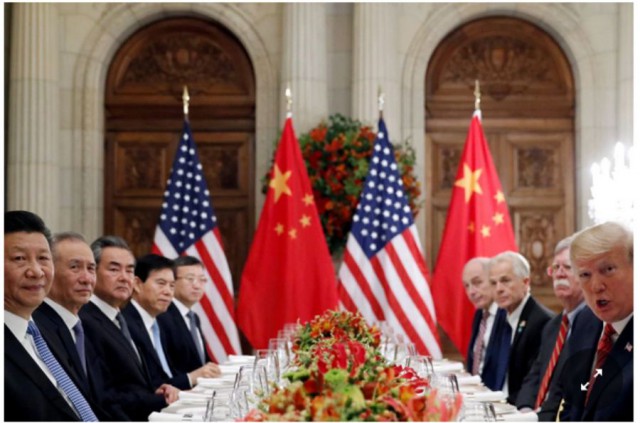
Trump eyes trade agreement with China in March


In the meantime, Trump said he likely will delay the increase in US tariff rates on $200bn/yr of imports from China, scheduled to increase to 25pc from 10pc on 2 March. Trump said the meeting with Xi could possibly take place at Trump's Mar-a-Lago property in Florida.
"We have a one time shot at making a deal between our countries," Trump said in the White House, in the presence of senior US and Chinese trade negotiators. The latest round of talks, which started yesterday, will be extended until 24 February to give the delegations more time to finalize the terms.
"Our expectation is to conclude this quickly and get to the point over the next few days of making progress and recommending a meeting between you and president Xi in March," treasury secretary Steven Mnuchin said.
"We made progress on some very important structural issues, but we have a few big hurdles we still have to face," US trade representative Robert Lighthizer said, in reference to Washington's insistence on guarantees to cut the US trade deficit, implement stronger IP protections and end forced technology transfers.
The US wants a pledge from Beijing that it will increase imports of agricultural, energy commodities and other US products in a bid to eliminate a $370bn/yr trade deficit. Trump said the US has also secured an agreement from Beijing to prevent "currency manipulation" — even though the US Treasury Department does not accuse China of that practice.
US and Chinese negotiators have prepared a number of memorandums of understanding (MoU) to document binding commitments from Beijing on buying specific products, Lighthizer and Mnuchin said, only to be overruled on the spot by Trump.
"Why do you bother putting it in the form of a letter of intent or whatever you wanna call it," Trump said. "An MoU is not a contract to the extent we want." Trump said he preferred all side deals to be combined into a comprehensive agreement he can sign with Xi.
"From now on, we will never use 'MoU,' we will use 'trade agreement,'" Lighthizer said.
"We believe it is very likely an agreement will happen and we believe we ultimately will succeed," China's vice premiere Liu He said.
Liu read a letter from Xi, who said possible progress in trade talks would be "well received in both countries and the international community" — emphasizing that the ongoing trade war is having a negative effect on economic growth in the US and China.
A delay in the tariff hike means the Xi-Trump summit will take place after the annual national legislative assembly meeting in Beijing in early March, an occasion China's leaders use to preview major changes in government policies.
Trump said he may be even willing to discuss setting aside financial fraud charges the US Department of Justice has brought against Chinese telecommunications firm Huawei, as part of a comprehensive deal. "We may or may not include it with this deal. I will have to discuss it with the attorney general," Trump said.
The trade war with China cut off a growing market for US oil and LNG exports in the second half of 2018. China took a small amount of US crude in November — a total of 250,000 bl for the month or 8,300 b/d — after exports stopped in the previous three months, US government data show. By comparison, China took an average of 377,000 b/d of US crude in January-July 2018 and was consistently the first or second top destination for US crude.
Trump last month announced a commitment from Xi to buy an additional 5mn t of US soybeans, which compares with 7.93mn t US exported to China in January-September 2018.
But US agriculture secretary Sonny Perdue declined to offer more details on the amount of US agricultural goods that China could buy, saying it would be "very premature" to offer specifics because they were contingent on a "grand deal" coming together and resolving core issues of structural reform.


Trump weighs using $2 billion in CHIPS Act funding for critical minerals

Codelco cuts 2025 copper forecast after El Teniente mine collapse

Electra converts debt, launches $30M raise to jumpstart stalled cobalt refinery

Barrick’s Reko Diq in line for $410M ADB backing

Abcourt readies Sleeping Giant mill to pour first gold since 2014

Nevada army depot to serve as base for first US strategic minerals stockpile

SQM boosts lithium supply plans as prices flick higher

Viridis unveils 200Mt initial reserve for Brazil rare earth project

Tailings could meet much of US critical mineral demand – study

Kyrgyzstan kicks off underground gold mining at Kumtor

Kyrgyzstan kicks off underground gold mining at Kumtor

KoBold Metals granted lithium exploration rights in Congo

Freeport Indonesia to wrap up Gresik plant repairs by early September

Energy Fuels soars on Vulcan Elements partnership

Northern Dynasty sticks to proposal in battle to lift Pebble mine veto

Giustra-backed mining firm teams up with informal miners in Colombia

Critical Metals signs agreement to supply rare earth to US government-funded facility

China extends rare earth controls to imported material

Galan Lithium proceeds with $13M financing for Argentina project

Kyrgyzstan kicks off underground gold mining at Kumtor

Freeport Indonesia to wrap up Gresik plant repairs by early September

Energy Fuels soars on Vulcan Elements partnership

Northern Dynasty sticks to proposal in battle to lift Pebble mine veto

Giustra-backed mining firm teams up with informal miners in Colombia

Critical Metals signs agreement to supply rare earth to US government-funded facility

China extends rare earth controls to imported material

Galan Lithium proceeds with $13M financing for Argentina project

Silver price touches $39 as market weighs rate cut outlook

















